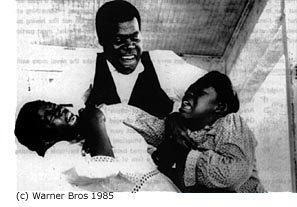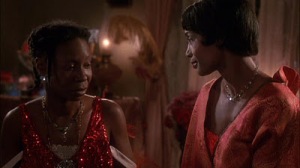I watched The Color Purple a couple times in the last few days although I watched it as a teen when it was released in 1985 it made me angry, really angry, as a radical feminist. Black women are doubly victimized in this movie. That double whammy is what got me thinking that I had to write.
I am really fucking angry for two reasons. The first is that third wave post-modern feminism would have me believe that I can’t talk about violence against black women because I’m appropriating their individual experience. Second, in this culture of fear of ‘appropriation’ it means that less women can talk about men’s violence against us. It essentially forces women to disconnect from each other. It’s a side effect of the term ‘intersectionality.’
As a disabled, middle aged, Jew I’m told that I can’t possibly understand a poor, black, woman like Celie, the main character, when Walker’s entire crux of the book is about a world of chaos and disjointedness evolving into one of connectedness.
As one of my readers, a woman of colour, told me: we need more women to speak up against male violence done to us. Essentially she reminded me that while she is black and I am white, we’re BOTH women. The reassurance that I should address misogyny, whether it comes from a black or white man, was important.
I wrote a scathing article about an misogynist man a bit ago, who happens to be black, who posts over on AVFM. I think that statement is critical: who happens to be black.
While writing that article I double and triple checked every word. I was walking on egg shells because I didn’t want to offend my black sisters or get called a racist in the sense that I was ‘co-opting’ experience. Honestly, I was more afraid of offending some 19 year old white 3rd wave feminist who just read about intersectionality in gender studies and was gonna come over here and give me problems. That’s the bitter truth.
The Color Purple features Celie and Nettie, two young sisters with an incestuous father who impregnates Celie twice. Both Celie’s infants are adopted/sold off after they’re born leaving her heartbroken and without. The only person that loves Celie is her sister Nettie who is banished from seeing Celie by Celie’s new husband who they call ‘Mister.’ The title of ‘mister’ can be any man because all the men collude in patriarchy.
Throughout this movie black men emulate ‘successful’ white men by enslaving black women and children. Celie was sold off like a farm animal to a black man, not a white man, where she cooked, cleaned, mothered children not her own, and spread her legs dutifully all while being beaten. She’s was also forced to care for her husband’s girlfriend Shug Avery, a sultry singer, who comes to live with them.
Shug is the antithesis of Celie. She’s the woman who decided to suck up to patriarchy by being a red-hot bar singer, tempting men with her skimpy red dresses and her shimmy shake. She gets the benefits of being a whore to all men, giving them what they want. Her father, a preacher, refuses to talk to her and we clearly see that Shug is desperate for male attention. She may have a freedom that Celie cannot conceive but even still she’s bound up in agony over a man.
Shug and Celie find common ground in their abuse by men. Celie comforts Shug and Shug reciprocates this love in a lesbian encounter that reaffirms the power of connected women.
‘Mister’s’ children are all cared for by Celie and they are just as bad as their father. In one scene where Mister yells at Celie to come give him a shave you see his only son Harpo swinging on a chair opposite. It’s a reminder even boy children are masters over grown women.
The movie doesn’t stray from the narrative of black man as patriarchal masters of women except one time. Sophie, Harpo’s adult wife, is at a gas station with her children while the mayor’s white wife is slobbering kisses on them and telling them how ‘clean’ they are. The mayor’s wife asks Sophie if she wants to be her maid and Sophie responds ‘heeellll no.’ The white mayor intervenes and Sophie clocks him in the head. The white people in the town circle Sophie poking and prodding her, calling her a nigger. When the Sheriff arrives Sophie screams for him to help her. She doesn’t realize he’s not on her side until he hits her in the head with the butt end of his gun.
Sophie gets 8 years in jail and when released is forced to be the Mayor’s wife’s maid.
Sophie eventually returns to live with Harpo and her children but she is broken, greyed and sits mumbling to herself. What’s interesting here is that Sophie wasn’t enslaved by her husband Harpo. They had a turbulent but loving marriage which resolves itself at the end. Walker wants us to remember that eventually a black woman will be enslaved and broken, whether by men in her own family or a white male stranger.
Celie gets her sister Nettie and her two children back from Africa where they lived with Missionaries. The reunion at the end of the movie is feminist candy. The women all move into Celie’s new home. Mister is stripped of his power.
The Color Purple is touted as a feminist movie. It’s never too late for a woman to wake up and while it’s heartbreaking to see so many years wasted on a man there is hope in your 40’s.
I sincerely hope that feminists, and radical feminists are the 4th wave as my regular reader V points out, can see that we have more things in common than not. This is not an attempt to steal black women’s experience but an attempt at correcting the unintended consequences caused by ‘intersectionality.’
There is no appropriation when we’re talking about woman hatred. It wears the same face in every patriarchal culture. My hope is that we start seeing women as a class again and not a mismatched collage of individuals who can’t frame male violence properly out of fear. Should we be afraid to name misogyny? Can we not be daughters of the same mother goddess?
When women, no matter the color, come together and bond we kick patriarchy in the teeth.


